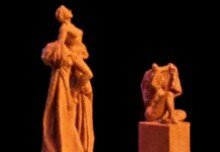On ‘His Mother’
Gouri turns a biblical victory into a human loss, taking the part of a defeated leader and his bereaved mother.
Characters mentioned only in passing in the Bible have often been a source of inspiration for later Hebrew literature. From ancient Jewish legends to recent poetry and prose, such minor figures have been elaborated upon and sometimes used as a means for expressing present-day attitudes. Gouri’s poem, for example, centers on the character of Sisera’s mother, who is mentioned only briefly, if perhaps strikingly, in the famous ‘Song of Deborah’ (Judges 5: 28-30), with which every Israeli school[child] is familiar.
Sisera, the leader of a Canaanite army, fought against Israel and was defeated by Barak and by the prophetess Deborah. After deserting the battlefield, he was lured into the tent of Jael, a chieftainess, who offered him milk and butter. He quenched his thirst and fell into a deep sleep; then Jael drove a wooden peg through his head and killed him. The ‘Song of Deborah’ triumphantly celebrates these deeds and goes on to describe the dead enemy’s mother as she awaited her son in vain:
The mother of Sisera looked out at a window, And cried through the lattice: Why is his chariot so long in coming? Why tarry the wheels of his chariots? Her wise ladies answered her, yea, she returned answer to herself: Have they not sped? have they not divided prey; to every man a damsel or two; to Sisera a prey of divers colors, A prey of divers colors of needlework, Of divers colors of needlework on both sides, meet for the necks of them that take the spoil?
Gouri’s poem follows the biblical text in its general argument and in some details, but it reverses the point of view. The poet takes the part of the defeated leader and of his bereaved mother.
The variation on the biblical passage has a distinctly subjective tone, for the poet speaks for himself in the first stanza and in his identification with the maidens’ silence. But his departure from Scripture is even more pronounced in the imaginatively descriptive passages. The image of the mother’s “silver-streaked hair” creates the emotional tone for what follows: the enemy’s mother, an aging woman, is waiting, like every mother, for the safe return of her son; but all she hears is the silence of his absence. While the maidens in her entourage (the biblical “wise ladies”) see in their imagination Sisera’s booty, the son himself lies dead. And since the enemy conceives Sisera not as an enemy but as a lamented son, it suggests that Jael behaved treacherously, violating the elementary code of hospitality.
The biblical hymn does not describe the moment when the mother learns of her son’s death, and neither does the poem. The poet passes from the mournful scene of silence and of slowly fading light to the conclusion, carefully admitting all reference to the triumphant cry of the ‘Song of Deborah’ – “So let all thine enemies perish, O Lord”, etc. The poem reproduces only the last few words of the chapter that tells, in the dry tone of the chronicle, that after the victory there came forty years of peace and security.
Note that the poet minimizes the outcome of that war. On the contrary, by changing the word order of the quotation, “And the land had rest forty years”, (Judges 5:31), and by repeating the time phrase in the same line, he stresses “forty years” – a long period of peace in a war-ridden country – and continues to praise the peace in affirming the absence of horrors. But these positive results seem to be diminished as they lie enclosed in the mood of tragedy and human loss suffered by the aging woman who herself died soon after her son’s death.
Although the poem is close to the Bible in vocabulary, the syntax and poetic forms are modern. The subdued tone avoids both sentimentality and rhetoric. It is almost an improvisation on a familiar theme, with utterly changed emphasis, in lines of varying length, which seem to be independent rhythmic segments.
From The Modern Hebrew Poem Itself: a New and Updated Edition. Edited by Stanley Burnshaw, T. Carmi, Susan Glassman, Ariel Hirschfeld and Ezra Spicehandler. Detroit: Wayne State University Press, 2003, 164-165








